QuestionPro has been a go-to for many, but the competition is heating up. With new players offering innovative features and established names upping their game, 2025 might be the right time to rethink your survey strategy. From sleek interfaces to powerful analytics, these alternatives are all about helping you listen to and learn from your customers. Let’s dive into the best options out there.
Key Takeaways
- Define your survey goals and select a tool that meets your objectives within your budget, considering both immediate and long-term costs.
- Choose an intuitive tool with essential features like customizable templates, automation workflows and real-time analytics.
- Opt for software that integrates with your tech stack and can scale as your business grows.
- Use free trials to evaluate the tool and prioritize strong customer support and robust security features.
Top QuestionPro Alternatives & Competitors
When exploring the best alternatives to QuestionPro, the right choice hinges on understanding what truly matters for your business. Here’s what to consider:
- Ease of Use: A survey tool should have an intuitive interface, saving time on setup and letting your team deploy surveys quickly without any hassle or steep learning curves.
- Features & Functionality: Evaluate the breadth and depth of the tool’s capabilities. Look for key features like customization, logic branching and real-time analytics. It should also support multi-channel survey distribution and provide robust reporting tools for actionable insights.
- Integration Capabilities: Seamless integration with your existing CRM, marketing automation, and other business tools is crucial. This ensures survey data flows smoothly into your broader customer data ecosystem for a fuller understanding of customer behavior and feedback.
- Pricing: Cost-effectiveness is essential, but so is value. Assess the pricing structure to ensure that it aligns with your budget while delivering the features you need.
- Scalability: Choose a survey tool that can grow with your business. Whether you’re a startup or an enterprise, it should handle everything from basic surveys to advanced analytics as your needs evolve.
- Customer Support: Responsive and knowledgeable customer support is key. Look for tools that offer multiple support options like live chat, phone assistance, and a comprehensive knowledge base to help you troubleshoot and get the most out of the platform.
Each of these will help you select a survey tool that fits your needs and drives meaningful customer feedback. Let’s check out the top alternatives to QuestionPro!
1. Retently: The All-in-One Customer Satisfaction Platform
Retently is a versatile customer experience management platform designed to help businesses measure, analyze, and enhance customer satisfaction. While it is well-known for its Net Promoter Score capabilities, Retently extends its functionality to include a full suite of CX metrics, such as Customer Satisfaction (CSAT) and Customer Effort Score (CES). The platform empowers organizations to gather actionable insights, automate feedback collection, and integrate these insights seamlessly into their workflows. Its intuitive interface and advanced features make it a strong choice for businesses aiming to systematically measure and improve customer satisfaction and engagement.
The platform’s unique campaign system allows businesses to create one-time, recurring, or transactional surveys tailored to specific customer segments, such as by customer lifecycle or demographics. This flexibility ensures that you capture the most relevant feedback to drive meaningful improvements. Additionally, Retently’s automation playbooks allow you to set up scenarios like sending follow-up messages to Detractors or exporting CX data directly to your CRM. But let’s get into more details to highlight Retently’s unique features:
Key Features:
- Comprehensive CX Metrics: Supports NPS, CSAT, and CES surveys, providing a well-rounded view of customer satisfaction, effort, and loyalty across different touchpoints.
- Advanced Survey Logic: Includes features like skip logic and question piping, enabling dynamic and personalized survey experiences tailored to respondent behavior.
- Anonymous Feedback Collection: Encourages honest responses by offering anonymous survey options, ideal for sensitive feedback scenarios.
- Multi-Channel Distribution: Distributes surveys via email, in-app messages, or web links, for a flexible and effective audience reach.
- Segmentation and Personalization: Real-time data segmentation allows businesses to create customer groups for more targeted survey campaigns and tailored feedback collection.
- Automated Workflows: Automated feedback collection, classification, and follow-up actions, which streamline the CX management process while saving time and resources.
- Advanced Analytics and Reporting: Provides tools to monitor trends, identify key drivers of customer satisfaction, and generate actionable insights through intuitive dashboards. Includes AI-powered insights for deeper analysis of feedback trends and themes.
- Integration Capabilities: Seamlessly integrates with CRM systems like Salesforce, marketing tools like HubSpot, and collaboration platforms like Slack to ensure feedback is actionable and synchronized across systems.
- Custom Branding: The customizable survey template editor allows the personalization of every aspect of the surveys, from logo placement to button styling, maintaining consistent branding throughout the feedback process.
- Text and Sentiment Analysis Tools: Helps businesses analyze customer emotions and anticipate trends, enabling proactive adjustments based on real-time feedback.
- Multi-Language Support: Reaches international audiences with multi-language surveys, expanding feedback collection capabilities globally.
Pricing:
Retently offers tailored plans for Ecommerce and B2B businesses to help manage customer experience data. All plans are flexible, allowing you to upgrade, downgrade, or cancel anytime. You can always follow the link for updated pricing and more details.
Currently, the B2B pricing features:
- Basic Plan: For $50/month, this plan includes 1,000 surveys (1 campaign, 1 seat), NPS, CSAT, and CES automation, survey branding, AI-driven feedback analysis, and trend reporting. Notifications are available via email, Slack, and Teams.
- Pro Plan: Priced at $299/month, this option offers 10,000 surveys (10 campaigns, 10 seats), advanced analytics, exportable NPS/CSAT scores, AI-powered insights, real-time notifications, with broad B2B integrations options, excluding Salesforce.
- Enterprise Plan: Starting at $599/month, annually, it suits large organizations requiring tailored solutions. It includes 10,000 surveys, API and Salesforce two-way integration, custom integrations, SSO, 2FA, and dedicated CSM support. Surveys are fully white-labeled with options for data residency.
Best Fit For:
Retently is best suited for businesses and teams seeking a comprehensive CX management solution that goes beyond basic surveys. Its advanced survey logic, multi-channel distribution options, and automation tools make it ideal for organizations aiming to collect and act on customer feedback efficiently. Additionally, businesses prioritizing anonymous feedback, personalized survey experiences, and seamless integrations with existing workflows will find Retently particularly effective. It’s an excellent choice for those looking to enhance customer satisfaction and loyalty while gaining deeper insights into customer behavior.
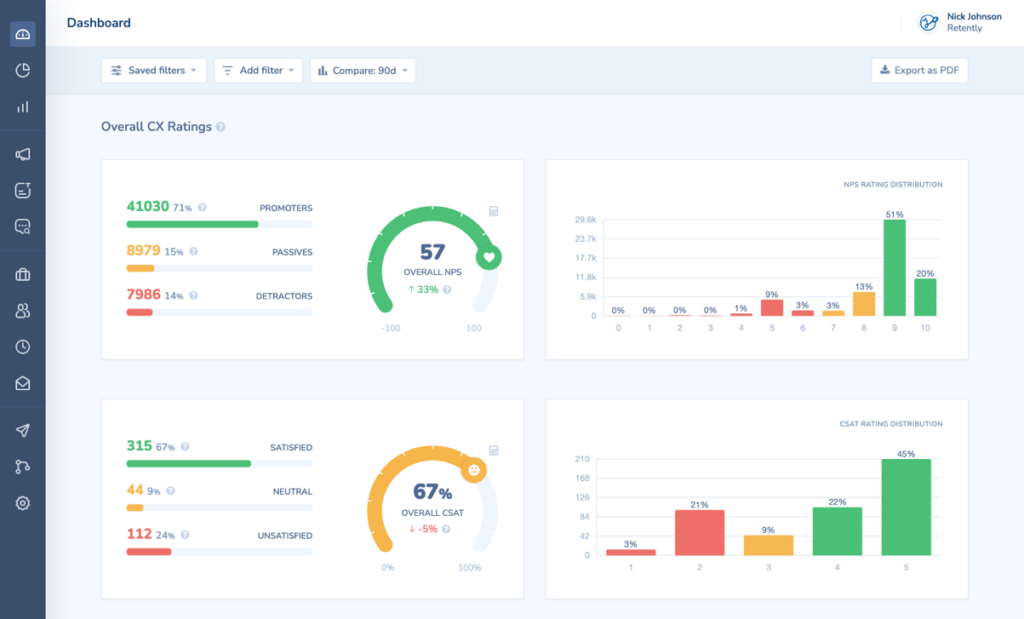
2. SurveyMonkey: Industry-Specific Templates for Quick Survey Creation
SurveyMonkey is one of the most recognized names in the survey industry, celebrated for its ease of use and accessibility. Designed with simplicity in mind, it offers pre-built templates that allow businesses to quickly create and distribute surveys without requiring technical expertise. The platform supports basic to moderately complex survey needs, making it a good QuestionPro alternative for those seeking straightforward solutions.
Key Features:
- Industry-Specific Templates: SurveyMonkey offers a variety of pre-built templates tailored for different industries and use cases, helping users create surveys quickly without starting from scratch.
- Diverse Distribution Channels: Surveys can be distributed via email, web links, SMS or QR codes, making it easy to reach a broad and diverse audience.
- Custom Branding and Logic Features: Users can customize surveys with logos, colors, and URLs. Logic tools like skip logic and question piping enhance personalization, tailoring the survey flow based on respondents’ answers.
- Software Integrations: Integrates seamlessly with popular tools like Salesforce, Tableau, and Marketo, enabling efficient data analysis and streamlined workflows.
- Anonymous Feedback Collection: Supports anonymous responses, ensuring participant privacy and encouraging honest feedback.
- Multilingual Options: Supports multiple languages, enabling businesses to reach international audiences.
Pricing:
With SurveyMonkey, you can choose from several plans that cater from solo users to large organizations, ensuring you get the features you need at a price that fits:
For Groups:
- Advantage Plan (€30/user/month, approximately $33, billed annually): With a minimum of 3 users, it includes 50,000 responses per year, shared survey access, centralized comment collection, custom branding and logic options.
- Premier Plan (€75/user/month, approximately $82, billed annually): With minimum 3 users, it offers up to 100,000 responses per year, multi-lingual surveys, advanced logic and reporting options, branded surveys, and post-survey redirects.
For Individuals:
- Standard Plan (€39/month, approximately $42): Unlimited surveys and questions, 1,000 responses per month, skip logic, text analysis and data exports (CSV, PDF, PPT, XLS).
- Advantage Plan (€38/month billed annually, approximately $41): This plan adds 15,000 responses per year, A/B testing, quotas, custom branding, multilingual surveys, and SPSS exports.
- Premier Plan (€99/month billed annually, approximately $107): Includes 40,000 responses annually, click map visualization, advanced logic, cross-tabulation, data trends, and fully branded surveys.
Enterprise Plan (custom pricing): It provides advanced user management, SSO, encryption, compliance options, and integrations with Salesforce and Tableau.
Best Fit For:
SurveyMonkey is best suited for businesses and teams that value simplicity and ease of use. It’s a relevant choice for those who need quick, customizable surveys with pre-built templates and basic logic features. However, it may not be the ideal solution for businesses requiring advanced customization, in-depth analytics, or support for larger teams, as these capabilities are more limited.
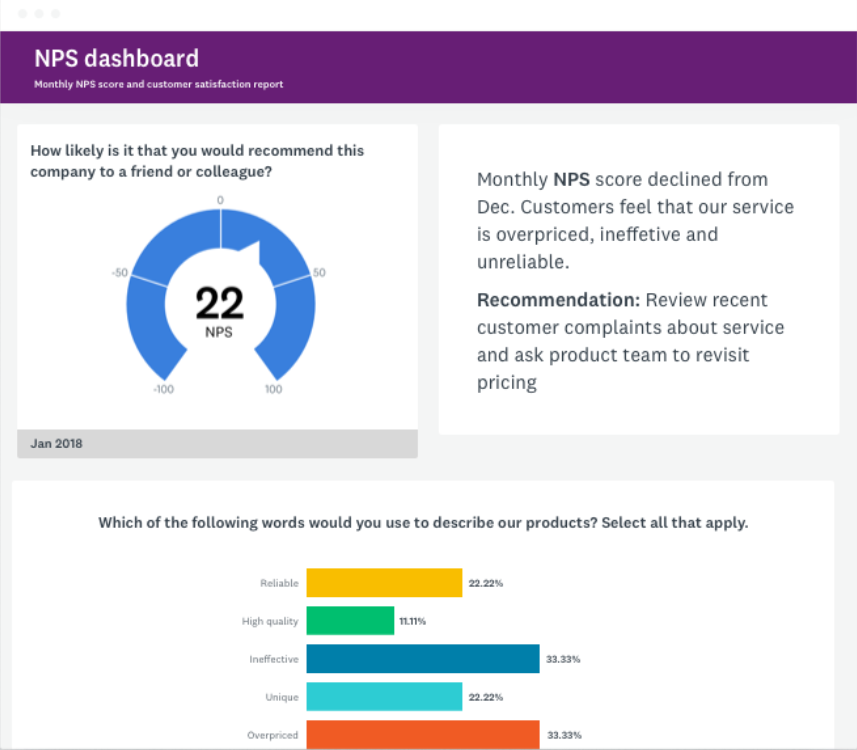
3. Qualtrics: Tailored for Enterprise-Level Organizations with Complex Survey Needs
Qualtrics is an experience management platform known for its advanced capabilities and comprehensive feature set. Originally designed for academic research, Qualtrics has evolved into a versatile tool used by businesses across various industries. One of its strengths is its ability to handle complex surveys with advanced logic and branching, making it efficient for detailed market research, customer experience programs, and employee feedback initiatives.
Qualtrics stands out for its analytics and reporting tools. It allows users to dive deep into data, with features like cross-tabulation and predictive analytics. Additionally, Qualtrics offers strong integration capabilities, connecting with CRM systems, marketing platforms, and other business tools to streamline data collection and analysis.
Key Features:
- AI-Driven Insights: Tools like Predict iQ and Text iQ to analyze and refine surveys for improved engagement and predictive insights.
- Advanced Analytics: Includes session replays, heatmaps, funnel analysis, and predictive modeling to better understand customer behavior and optimize journeys.
- Omnichannel Accessibility: Centralized customer interactions across touchpoints, ensuring surveys are accessible on any device.
- Automated Workflows: Streamlined processes with action plans, ticketing systems and root-cause analysis.
- Real-Time Feedback Analysis: Analysis of unstructured feedback in real-time with capabilities to integrate with external social listening tools for broader coverage.
- Integration and Customization: Integration with tools such as CRMs, ERPs, or marketing automation platforms. Dynamic dashboards and tailored experiences through detailed customer profiles.
Pricing:
Qualtrics offers custom pricing options designed to align with an organization’s goals in customer and employee experience management as follows:
- Customer Experience: Tailored to enhance customer satisfaction and engagement.
- Employee Experience: Focused on improving employee engagement and workplace culture.
- Strategy & Research: Designed for in-depth market research and strategic planning.
While this model provides flexibility for large enterprises, smaller businesses may find it difficult to predict costs, especially with usage-based pricing.
Best Fit For:
Qualtrics is best suited for large enterprises or academic institutions that require a sophisticated tool for in-depth research and experience management. It’s particularly beneficial for businesses that need to conduct detailed CX surveys, employee engagement assessments or comprehensive market research studies. Organizations with complex workflows and those needing to integrate survey data into broader business strategies will find Qualtrics especially valuable. However, smaller companies with more basic needs may find it too complex and costly.
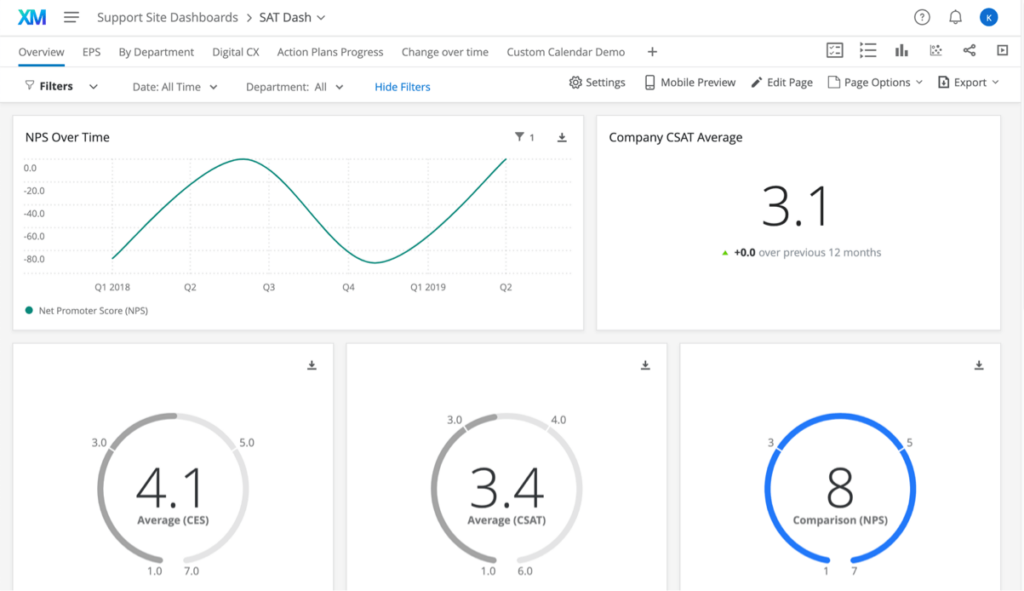
4. Alchemer: From Survey to In-Depth Research
Alchemer, formerly known as SurveyGizmo, is a flexible survey platform that stands out for its advanced customization options, a good range of question types, and dynamic logic features. It’s well-suited for large-scale surveys, offering features like branching, quotas, and randomization to ensure accurate data collection. The platform also provides helpful reporting tools, allowing to break down data. The platform integrates smoothly with various CRM systems and business tools, making it an adaptable solution for those looking to streamline their feedback processes.
Key Features:
- Extensive Question Variety: Offers various question types, including specialized options like Max Diff and Conjoint.
- Advanced Logic and Branching: Provides over 20 logic options, such as Question Piping and Skip Logic, to tailor surveys to respondents’ answers and improve data quality.
- Data Reporting & Exports: Includes customizable reports like Open Text Analysis, Conjoint Analysis, and Crosstab, along with SPSS and raw data exports for advanced data analysis.
- Integration Capabilities: Connects with over 600 tools, easily syncing survey feedback with existing systems.
- Custom Branding and White-Labeling: Alchemer allows users to fully customize the appearance of their surveys, including logos, colors, and themes, to align with their brand identity.
- Team Collaboration: The platform supports collaborative survey creation and management by enabling the assignment of roles and permissions to team members.
Pricing:
Alchemer provides a range of pricing tiers, making it easy to find the best fit whether you’re an individual user or part of a small team:
- Collaborator: For individuals needing simple polls and surveys at $55 per user per month.
- Professional: For teams of 1-3, providing essential data collection tools at $165 per user per month.
- Full Access: For teams of 1-3 needing more robust features at $275 per user per month.
- Business Platform: Custom pricing for those needing advanced feedback collection, admin and security features, including unlimited responses, panel studies and SSO.
Best Fit For:
Alchemer is suitable for businesses looking for a customizable survey tool that can scale from simple feedback collection to advanced market research. It’s especially useful for teams that require detailed logic, branching, and easy integrations but may not need the high-end capabilities of more expensive competitors like Qualtrics. Still, the platform’s rich customization and advanced features may take some time to fully explore and master, requiring a bit of a learning investment. Moreover, as is the case of Qualtrics, the advanced functionalities might be an overkill for straightforward survey needs.
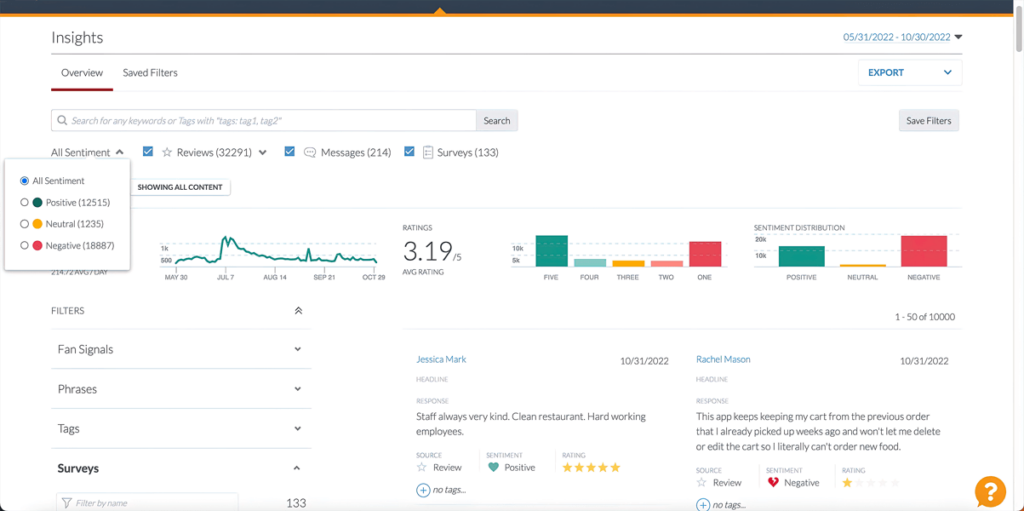
5. Typeform: Interactive, Visually Engaging Forms
Typeform is a survey and form-building platform known for its user-friendly design and interactive approach aimed to keep respondents more engaged. With over 3,000 customizable pre-built templates and a variety of question types, users can create everything from simple polls to market research forms. Additionally, the platform’s real-time adaptive questioning adds a personal touch, ensuring each respondent’s journey is relevant and tailored to their specific answers.
Key Features:
- Conversational Format: Forms are presented one question at a time, improving user engagement.
- Customizable Design: Offers various design options, including themes, custom branding, and interactive elements.
- Dynamic Logic: Features like logic jumps and conditional questions personalize the survey experience based on user responses.
- Integration Capabilities: Integration with popular tools like Google Sheets, Zapier, Slack, HubSpot, and more for streamlined workflows.
- Data Visualization: Basic reporting and visual representation of responses for quick insights.
- Optional Media Integration: Availability to include videos and images within forms.
- Multi-Language Support: Users can create forms in multiple languages, tailoring surveys for different audiences.
Pricing:
Typeform has options designed to suit various levels of engagement and functionality. Each plan is billed monthly with options for annual savings. The plans are segmented into Core and the newly added Growth options:
Core Plans:
- Basic: For $29 per month, this plan includes 100 responses per month, 1 user, unlimited questions and forms but retains Typeform branding.
- Plus: At $59 per month, this plan adds more customization, with 1,000 responses per month, 3 users, and the ability to remove Typeform branding and use a custom subdomain.
- Business: This $99 per month plan offers 10,000 responses per month, 5 users, and features like drop-off rate/conversion tracking and priority support.
- Enterprise (custom pricing): Tailored for large-scale businesses it includes customizable response limits and seats, advanced features like SSO and compliance options.
Growth Plans:
- Growth Essentials: $199/month (3 seats, 1,000+ responses/month, enrich 300 responses/month). It also includes video questions/answers, reCAPTCHA and custom subdomain.
- Growth Pro: $349/month (5 seats, 10,000+ responses/month, enrich 1,500 responses/month). It adds multi-language forms, and integrations with Salesforce and analytics tools.
- Growth Custom: You need to contact sales for cost estimates (custom seats, 20,000+ responses/month, enrich 3,000 responses/month). It includes unlimited viewer seats, a custom domain and enhanced security like two-factor authentication.
Best Fit For:
Typeform is best suited for businesses that prioritize user experience in their data collection efforts. It is appropriate for customer feedback, event registration, and market research, particularly for companies that value design and interactivity. Yet, Typeform’s focus on simplicity and design may limit its suitability for complex, data-heavy surveys or detailed analytics needs.
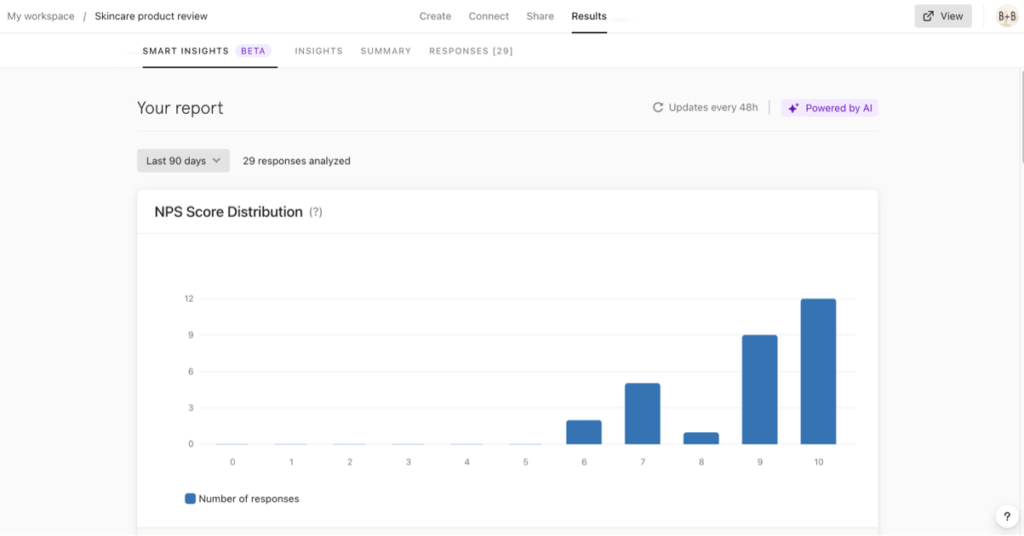
6. SurveySparrow: Conversational Surveys for Customer and Employee Feedback
Appropriate for both customer and employee feedback, the platform supports various survey types, including NPS, CSAT, and CES, and allows for seamless distribution across multiple channels. SurveySparrow also offers a range of pre-designed templates that simplify the survey creation process, allowing businesses to choose from over 1,000 templates to fit various use cases. With a selection of customization options and multi-language support, it is able to maintain brand consistency while reaching a global audience.
Key Features:
- Automation & Workflows: Streamlined survey creation, distribution, and follow-ups with AI-powered tools and custom workflows, including contact management for targeted surveys.
- Customizable Surveys: Various customization options, including white-label features and custom domains for brand consistency (although available only in high-tier plans).
- Omni-Channel Data Collection: Feedback collection across email, SMS, social media, and in-app embeds.
- Offline Data Collection: Feedback collection even without an internet connection using the offline survey app.
- 360-Degree Assessments: Comprehensive employee evaluations to provide a well-rounded view of performance.
- Team Collaboration: Features like user management and workspaces streamline survey collaboration across teams.
Pricing:
SurveySparrow offers a free trial and pricing plans that cater to different survey and collaboration needs, from individuals to larger teams, as follows:
- For Individuals: It starts simple with the Basic Plan ($19/month) for 2,500 responses and essential features like email surveys and display/skip logic. It upgrades to the Starter Plan ($39/month) for 15,000 responses, survey translation, and more integrations.
- For Teams: Teams can collaborate with the Business Plan ($79/month), offering 50,000 responses, 3 users, custom branding, workflows, and location tracking. They can scale with the Professional Plan ($249/month) for 100,000 responses, 5 users, sentiment analysis, CSS customization, and auto-translation to 130+ languages.
- For Enterprises: Tailored plans with custom limits and plugins, survey throttling, advanced analytics, and a dedicated Customer Success Manager.
Best Fit For:
SurveySparrow is best suited for those looking for interactive surveys – the conversational design – for customer feedback or employee engagement. It’s relevant for companies that prioritize customization and branding, with moderate technical needs and budget flexibility.
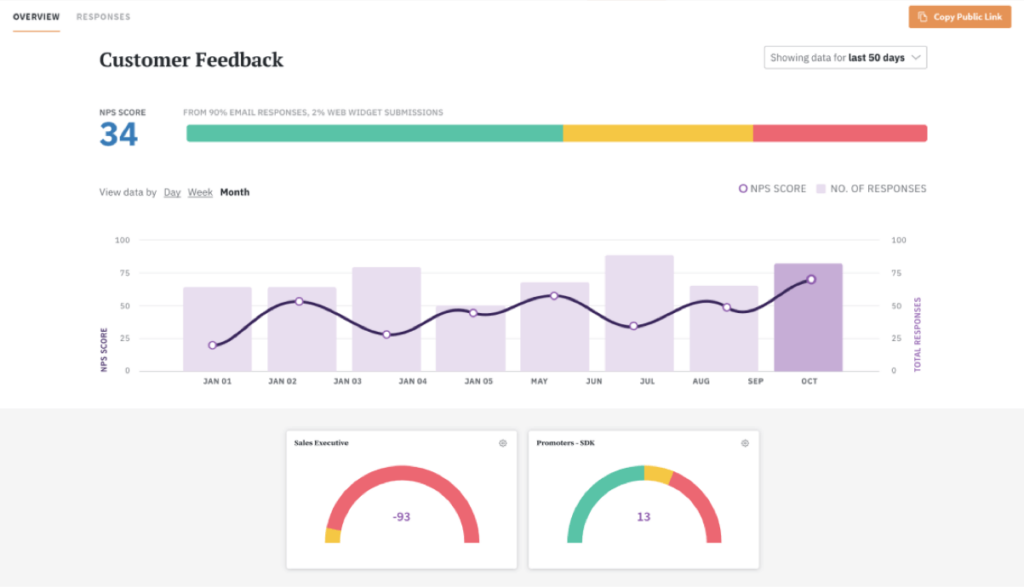
7. Nicereply: Real-Time Customer Feedback With Post-Resolution Surveys
The tool enables businesses to monitor customer satisfaction by focusing on NPS, CSAT, and CES metrics. Its integration with helpdesk platforms allows teams to efficiently gather insights and leverage feedback to refine processes. Additionally, the platform supports tracking feedback at different levels, providing performance insights for agents, teams and regions.
Key Features:
- Comprehensive Survey Metrics: Supports NPS, CSAT and CES.
- Multi-Channel Distribution: Users can share surveys through website pop-ups, direct links, and post-resolution emails.
- Survey Customization: Tailored surveys to match the brand, from design to rating scales.
- Streamlined Integration: Integrates with platforms like Zendesk, Helpscout, Front, and Pipedrive, enabling feedback management within existing workflows.
- Instant Feedback Recording: Captures responses as soon as customers interact, even if they don’t complete the survey.
- Real-Time Analytics: Access to feedback through dashboards and reporting tools for quick data-driven decisions.
Pricing:
Nicereply provides tiered pricing plans to support businesses in managing customer feedback:
- Starter: $79/month for 3 users and 100 responses.
- Essential: $149/month for 10 users and 250 responses.
- Growth: $299/month for 25 users and 1,000 responses.
- Business: $449/month for 50 users and 2,500 responses.
Best Fit For:
Nicereply is a relevant choice for small to medium-sized teams looking to streamline their feedback collection without the overhead of complex setup or customization. It’s particularly suited for customer service or support teams using helpdesk platforms like Zendesk, Front, or Pipedrive, which aim to improve performance.
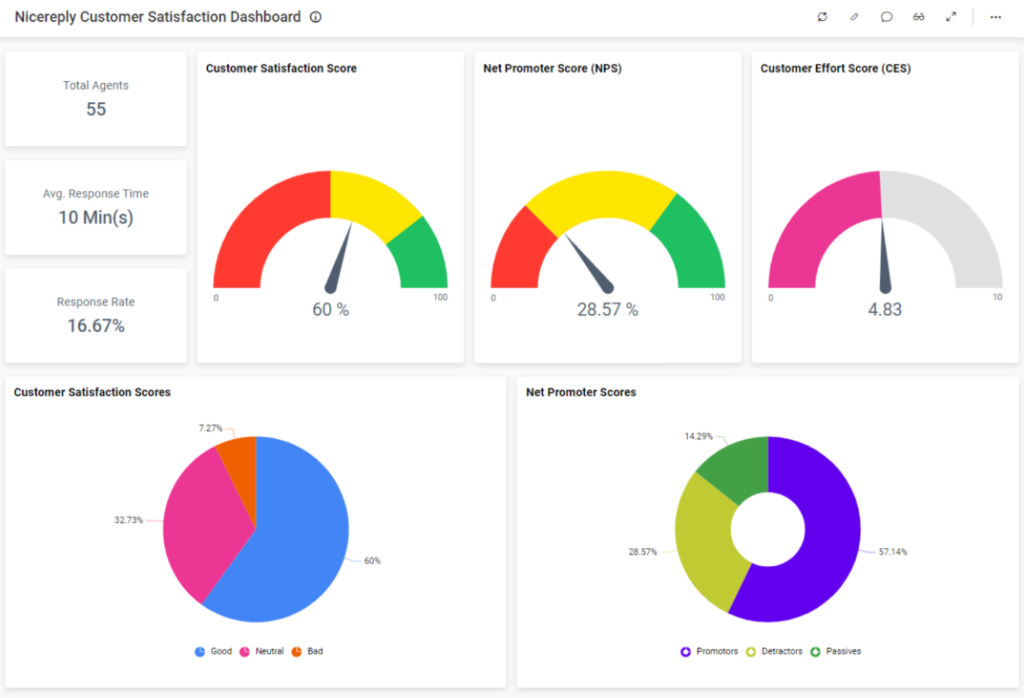
8. Google Forms: A Simple, Accessible Solution for Basic Survey Needs
Google Forms is a simple, free tool within the Google Workspace suite, designed to make survey creation accessible to anyone, regardless of technical expertise. Its intuitive interface allows users to create surveys, quizzes, and forms with ease, making it a popular choice for small-scale projects.
One of its standout features is automatic response visualization, which instantly converts survey data into charts and graphs. This makes it easier to interpret results at a glance. Google Forms also supports basic customization options, such as adding images, videos, and changing themes to match your brand or style. Its integration with Google Workspace tools like Gmail, Google Drive, Google Calendar, Google Sheets boosts productivity by keeping everything within the familiar Google ecosystem.
Key Features:
- Drag-and-Drop Survey Builder: Easy-to-use interface for quick survey creation.
- Cloud Collaboration: Real-time teamwork on surveys from any location.
- Response Visualization: Automatic charts and graphs from survey data.
- Google Sheets Integration: Seamless data export for more in-depth analysis.
- Template Library: Pre-built, customizable templates to help you get started fast.
- Email Notifications: Alerts for new survey responses.
Pricing:
Google Forms is free for all users with a Google account, allowing you to create surveys, quizzes, and forms at no cost. Fees are required only if you choose to upgrade to a Google Workspace plan for more advanced features and storage options.
Best Fit For:
Google Forms is best suited for small teams and individuals seeking a straightforward, cost-effective solution for surveys, event registrations, quizzes and basic data collection tasks. It’s also a great fit for those already using the Google Workspace. However, for more advanced survey needs with extensive customization and robust analytics, specialized tools are more suitable.
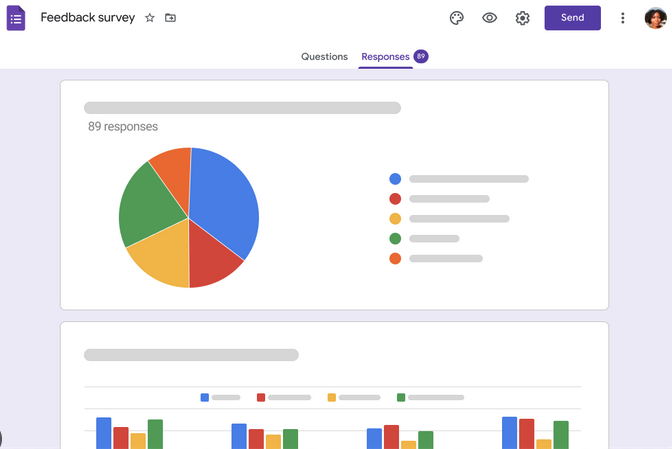
Wrapping-Up
When deciding on the best QuestionPro alternative, consider your specific requirements and prioritize the tools that align with your strategic goals. Here are nine expert tips to guide your decision:
- Identify Your Goals: Whether for customer feedback, employee engagement, or market research, understand what you want to achieve.
- Set a Budget: Choose a tool that fits your budget while factoring in both short-term and long-term costs.
- Ease of Use: Opt for software with an intuitive interface, minimizing the learning curve for both you and your respondents.
- Evaluate Features: Beyond basic survey creation, look for advanced capabilities like customization options, automation workflows and smart analytics.
- Integration Capabilities: Ensure the software integrates seamlessly with your existing tools, such as CRMs or marketing platforms, to streamline workflows and enhance data analysis.
- Scalability: Choose software that can grow with your business, offering additional features and capacity as your needs evolve.
- Customer Support: Prioritize tools with comprehensive support, from live chat to dedicated account managers, to help you troubleshoot issues as they arise.
- Security and Privacy: Make sure the platform complies with data protection regulations and offers strong security features, especially when handling sensitive information.
- Test with Free Trials: Take advantage of free trials or demo versions to explore the software’s features and see if it aligns with your business needs before committing.
If customer satisfaction metrics like NPS, CSAT and CES are what you’re after, specialized platforms like Retently might be your best bet. It’s packed with everything needed to empower your business – real-time insights, customizable surveys, and powerful analytics that help you understand your customers and drive meaningful improvements. Actionable insights are just a click away. Explore Retently in a free trial and see how Retently can help your businesses grow through better customer understanding.





























 Greg Raileanu
Greg Raileanu 
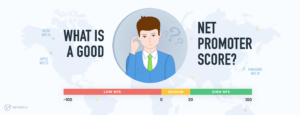

 Alex Bitca
Alex Bitca 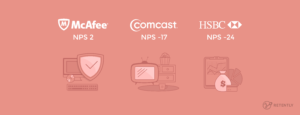


 Christina Sol
Christina Sol